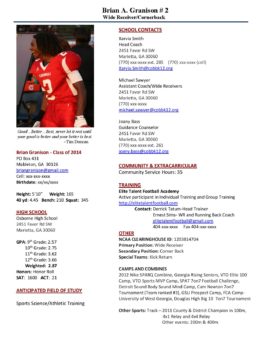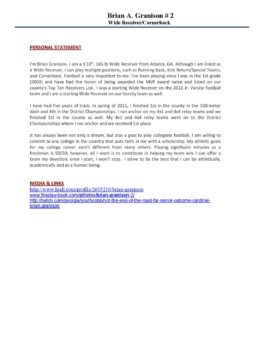By Joyce Oscar
As parents we support our children when they choose a sport. We pay fees, purchase equipment and attend games and events. What about the other side…the business side. Yes, sports have a business side and if your athlete is serious about continuing to play past little league and high school, it pays to know the business of athletics. Securing a spot on a college football team is much like interviewing for a job.
An athletic resume can be one of the most important aspects of getting exposure that could lead to recruitment. It’s something a coach will see when he opens your email. Taking the extra time to write a good cover letter can be the difference between a coach responding to your email and ignoring it. With the growing number of great athletes, competing for that spot on a team has become more aggressive so you want to always be ahead of the game.
“Why should I recruit you?” This is a question you want your resume to help answer. Football coaches are among the hardest coaches to contact because of the sport’s popularity in the United States. Putting together all of your pertinent information, along with being persistent and proactive, will help you find the most suitable collegiate playing opportunity.
- Personally address the resume to the coach receiving it. Coaches prefer a personalized email as opposed to a generic one. If you send a generic email it is tough for a coach to determine your level of interest in their university- which makes them less likely to respond. Starting your email off with: Dear (Coach’s Last Name) will go a long way and heighten your level of interest.
- Know your academic information. You want to include your academics on your resume. Many athletes believe just because they are good at their sport their academic profile does not matter. However, the NCAA is more focused than ever on increasing academic requirements and raising graduation rates, which translates into coaches being more focused on the academic profile of an athlete.
- Include contact information. While most coaches will be more than happy to communicate with you via email, others may prefer different methods of communication. The key to a good resume is to make all your important information as accessible as possible.
- Include links to your highlights. Coaches want to see what you can do, not just hear about it.
When my son was looking for recruitment his attached resume was responded to each time he contacted a coach via email. Don’t just rely on your high school coach to reach out to college coaches for you. They have an entire team to think about…you only have yourself.



